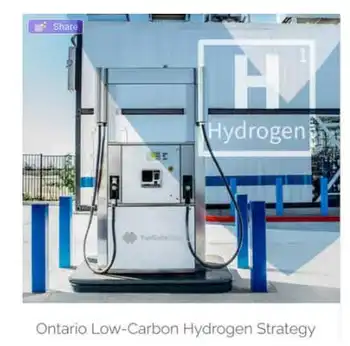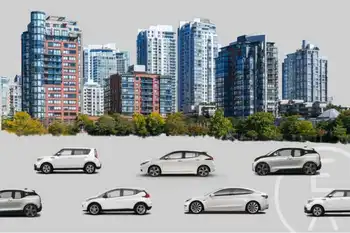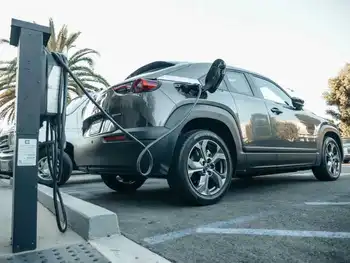Canada EV-ready rules for MURBs vary by city, with municipal bylaws dictating at-home Level 2 charging in condos, apartments, strata, and townhomes; BC leads, others evaluating updates to building codes.
Key Points
Municipal bylaws mandate EV-ready, Level 2 charging in multi-unit housing; requirements vary by city.
✅ No federal/provincial mandates; municipal bylaws set EV access.
✅ B.C. leads; many cities require 100% EV-ready residential stalls.
✅ Other cities are evaluating code changes; enforcement varies widely.
An absence of federal, provincial rules for EV charging in Canada’s condos, apartment buildings, strata or townhomes punts the issue to municipalities and leaves many strata owners to fend for themselves, finds Electric Autonomy’s cross-Canada guide to municipal building code regulations for EV charging in MURBs
When it comes to reducing barriers to electric vehicle adoption in Canada, one of the most critical steps governments can do is to help provide access to at-home EV charging.
While this is usually not a complicated undertaking in single-unit dwellings, in multi-unit residential buildings (MURBs) which includes apartments, condos, strata and townhomes, the situation and the experience is quite varied for Canadian EV drivers, and retrofitting condos can add complexity depending on the city in which they live.
In Canada, there are no regulations in the national building code that require new or existing condos, apartment buildings, strata or townhomes to offer EV charging. Provinces and territories are able to create their own building laws and codes, but none have added anything yet to support EV charging. Instead, some municipalities are provided with the latitude by their respective provinces to amend local bylaws and add regulations that will require multi-residential units — both new builds and existing ones — to be EV-ready.
The result is that the experience and process of MURB residents getting EV charging infrastructure access is highly fragmented across Canada.
In order to bring more transparency, Electric Autonomy Canada has compiled a roundup of all the municipalities in Canada with existing regulations that require all new constructions to be EV-ready for the future and those cities that have announced publicly they are considering implementing the same.
The tally shows that 21 cities in British Columbia and one city in both Quebec and Ontario have put in place some EV-ready regulations. There are eight other municipalities in Alberta, Saskatchewan, Ontario, Nova Scotia and Newfoundland evaluating their own building code amendments, including Calgary’s condo charging expansion initiatives across apartments and condos.
No municipalities in Manitoba, Prince Edward Island and New Brunswick have any regulations around this. City councils in Edmonton, Saskatoon, Hamilton, Sarnia, Halifax and St. John’s have started looking into it, but no regulations have officially been made.
British Columbia
B.C. is, by far, Canada’s most advanced province in terms of having mandates for EV charging access in condos, apartment buildings, strata or townhomes, leading the country in expanding EV charging with 20 cities with modified building codes to stipulate EV-readiness requirements and one city in the process of implementing them.
City of Vancouver: Bylaw 10908 – Section 10.2.3. was amended on July 1, 2014, to include provisions for Level 2 EV charging infrastructure at all residential and commercial buildings. On March 14, 2018, the bylaw was updated to adopt a 100 per cent EV-ready policy from 20 per cent to 100 per cent. The current bylaw also requires one EV-ready stall for single-family residences with garages and 10 per cent of parking stalls to be EV-ready for commercial buildings.
City of Burnaby: Zoning Bylaw 13903 – Section 800.8, which took effect on September 1st, required Level 2 energized outlets in all new residential parking spaces. This includes both single-family homes and multi-unit residential buildings. Parking spaces for secondary suites and visitor parking are exempt, but all other stalls in new buildings must be 100 per cent EV-ready.
City of Nelson: The city amended its Off-Street Parking and Landscaping Bylaw No. 3274 – Section 7.4 in 2019 to have at least one parking space per dwelling unit feature
Level 2 charging or higher in new single-family and multi-unit residential buildings, starting in 2020. For every 10 parking spaces available at a dwelling, two stalls must have Level 2 charging capabilities.
City of Coquitlam: The Zoning Bylaw No. 4905 – Section 714 was amended on October 29, 2018, to require all new construction, including single-family residences and MURBs, to have a minimum of one energized outlet capable of Level 2 charging or higher for every dwelling unit. Parking spaces designated for visitors are exempt.
If the number of parking spaces is less than the number of dwelling units, all residential parking spots must have an energized outlet with Level 2 or higher charging capabilities.
City of North Vancouver: According to Zoning Bylaw No. 6700 – Section 909, all parking spaces in all new residential multi-family buildings must include Level 2 EV charging infrastructure as of June 2019 and 10 per cent of residential visitor parking spaces must include Level 2 EV charging infrastructure as of Jan. 2022.
District of North Vancouver: Per the Electric Vehicle Charging Infrastructure Policy, updated on March 17, 2021, all parking stalls — not including visitor parking — must feature energized outlets capable of providing Level 2 charging or higher for multi-family residences.
City of New Westminster: As of April 1, 2019, all new buildings with at least one residential unit are required to have a Level 2 energized outlet to the residential parking spaces, according to Electric Vehicle Ready Infrastructure Zoning Bylaw 8040, 2018. Energized Level 2 outlets will not be required for visitor parking spaces.
City of Port Moody: Zoning Bylaw No. 2937 – Section 6.11 mandated that all spaces in new residential constructions starting from March 1, 2019, required an energized outlet capable of Level 2 charging. A minimum of 20 per cent of spaces in new commercial constructions from March 1, 2019, required an energized outlet capable of Level 2 charging.
City of Richmond: All new buildings and residential parking spaces from April 1, 2018, excluding those provided for visitors’ use, have had an energized outlet capable of providing Level 2 charging or higher to the parking space, says Zoning Bylaw 8500 – Section 7.15.
District of Saanich: Zoning Bylaw No. 8200 – Section 7 specified that all new residential MURBs are required to provide Level 2 charging after Sept. 1, 2020.
District of Squamish: Bylaw No. 2610, 2018 Subsection 41.11(f) required 100 per cent of off-street parking stalls to have charging infrastructure starting from July 24, 201, in any shared parking areas for multiple-unit residential uses.
City of Surrey: Zoning By-law No. 12000 – Part 5(7) was amended on February 25, 2019 to say builders must construct and install an energized electrical outlet for 100 per cent of residential parking spaces, with home and workplace charging rebates helping adoption, 50 per cent of visitor parking spaces, and 20 per cent of commercial parking spaces. Each energized electrical outlet must be capable of providing Level 2 or a higher level of electric vehicle charging
District of West Vancouver: Per Zoning Bylaw No. 4662 – Sections 142.10; 141.01(4), new dwelling units, all parking spaces for residential use, except visitor parking, need to include an energized outlet that is: (a) capable of providing Level 2 charging for an electric vehicle; (b) labelled for the use of electric vehicle charging.
City of Victoria: In effect since October 1, 2020, the Zoning Bylaw No. 80-159 – Schedule C Section 2.4 stipulates that all residential parking spaces in new residential developments must have an energized electrical outlet installed that can provide Level 2 charging for an electric vehicle, and residents can access EV charger rebates to offset costs. This requirement applies to both single-family and multi-unit residential dwellings but not visitor parking spaces.
Township of Langley: In Zoning Bylaw No. 2500 – Section 107.3, all new residential construction, including single-home dwellings, townhouses and apartments, required one space per dwelling unit to have EV charging requirements, starting from Nov. 4, 2019.
Town of View Royal: As per Zoning Bylaw No. 900 – Section 5.13, every commercial or multi-unit residential construction with more than 100 parking spots must provide an accessible electric vehicle charging station on the premises for patrons or residents. This bylaw was adopted on Feb. 2021.
Nanaimo: According to the Off-Street Parking Regulations Bylaw No. 7266 – Section 7.7, a minimum of 25 per cent of all off-street parking spots in any common parking area for multifamily residential housing must have shared access to a Level 2 EV charging, and have an electrical outlet box wired with a separate branch circuit capable of supplying electricity to support both Level 1 and Level 2 charging.
Port Coquitlam: For residential buildings that do not have a common parking area, one parking space per dwelling unit is required to provide “roughed-in” charging infrastructure, put in effect on Jan. 23, 2018. This must include an electrical outlet box located within three metres of the unit’s parking space, according to Zoning Bylaw No. 3630 – Section 2.5.10;11. For a residential building with a common parking area, a separate single utility electrical meter and disconnect should be provided in line with the electrical panel(s) intended to provide EV charging located within three metres of the parking space.
Maple Ridge: The city’s Bylaw No. 4350-1990 – Schedule F says for apartments, each parking space provided for residential use, excluding visitor parking spaces, will be required to have roughed-in infrastructure capable of providing Level 2 charging.
Apartments and townhouses with a minimum of 50 per cent of required visitor parking spaces will need partial infrastructure capable of Level 2 charging.
White Rock: The city is currently considering changes to its Zoning Bylaw, 2012, No. 2000. On March 18, 2021, the Environmental Advisory Committee presented recommendations that would require all resident parking stalls to be Level 2 EV-ready in new multi-unit residential buildings and 50 per cent of visitor parking stalls to be Level 2 EV-ready in new multi-unit residential buildings.
Kamloops: The city of Kamloops is looking to draft a zoning amendment bylaw that would require new residential developments, all new single-family, single-family with a secondary suite, two-family, and multi-family residential developments, to have EV-ready parking with one parking stall per dwelling unit, at the beginning of Jan. 1, 2023.
Kamloops’ sustainability services supervisor Glen Cheetham told Electric Autonomy Canada in an email statement that the city’s council has given direction to staff to “conduct one final round of engagement with industry before bringing the zoning amendment bylaw to Council mid-June for first and second reading, followed by a public hearing and third reading/approval.”
Related News












